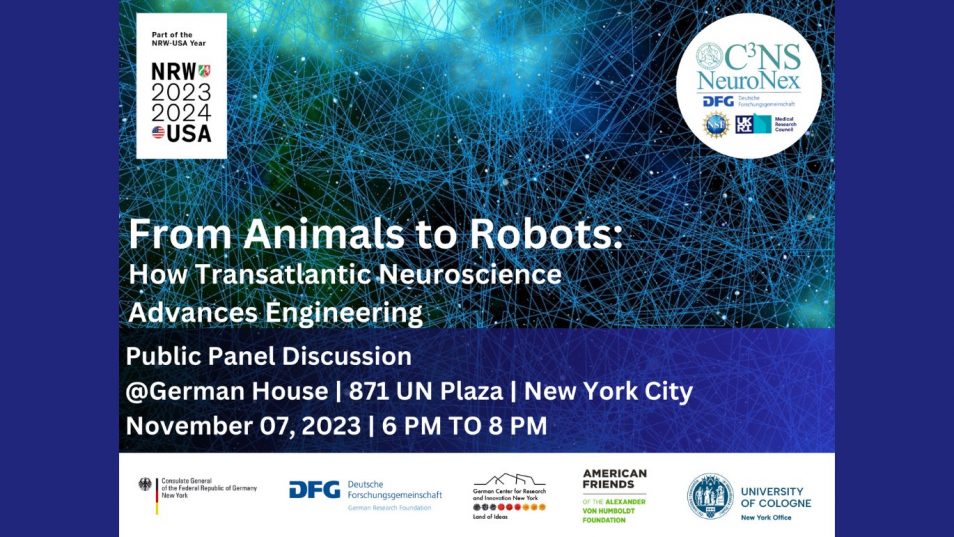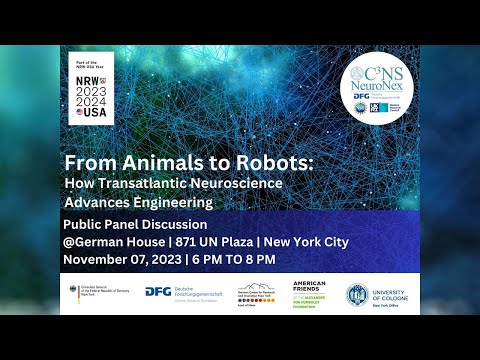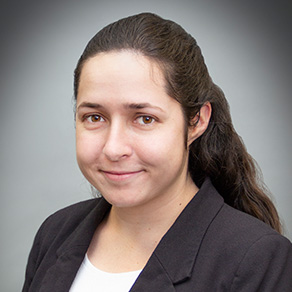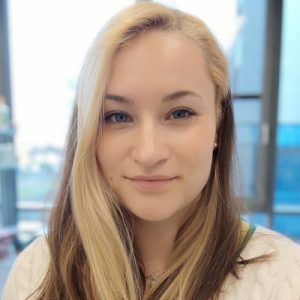From Animals to Robots: How Transatlantic Neuroscience Advances Engineering
 © UoC
© UoC
The University of Cologne New York Office together with the German Consulate New York, the German Research Foundation (DFG) North America, the American Friends of the Alexander von Humboldt Foundation, and the German Center for Research and Innovation New York (DWIH) hosted a panel discussion at the German House in New York on November 7, 2023.
Event Recording

To play the video, click the thumbnail. Once activated data will be transmitted to the respective provider. Watch on YouTube
To the Photo Gallery on smugmug.com!
How are animals so remarkably effective in getting around in the world? A striking feature of animal behavior is its flexibility, adaptability, and resilience. Whether one is swatting away fruit flies, admiring a squirrel scrambling up the trunk of a tree, or trying to chase cockroaches out of an apartment, the agility and speed with which animals can respond to avoid danger and achieve their goals is impressive. Understanding how the body and brain work together to create such adaptive behavior could create new technical solutions including novel, autonomous robots. Such innovations can contribute to increasing our society’s resilience when dealing with global challenges.
Participants of this public panel discussion can hear from experts in the areas of neuroscience, robotics, and control who work together within the Communication, Coordination and Control in Neuromechanical Systems (C3NS) network (C3NS website). C3NS is an innovative transatlantic research program, co-funded by the National Science Foundation (NSF) together with the German Research Foundation (DFG), as well as Canadian and UK partner organizations. It is part of NSF’s Novel Networks for Neuroscience – NeuroNex – project.
Watch the recording to
- Discover how robotics and engineering can be advanced through neuroscience and the study of flexible animal behavior
- Experience the power of a transatlantic and interdisciplinary collaboration between North America and Europe at an exciting research frontier
The event was part of the NRW-USA Year 2023-2024.
Not in New York City? Perhaps you are interested in our Washington, D.C. event on a similar topic.
Event Information
November 7, 2023, 6:00 PM to 8:30 PM
German House, New York City
Organizer(s): University of Cologne NY Office, German Consulate General New York, German Research Foundation (DFG) North America, American Friends of the Alexander von Humboldt Foundation, German Center for Research and Innovation (DWIH) New York
Our Experts

Ansgar Büschges is a full professor for Animal Physiology and Neurobiology at the Institute of Zoology, University of Cologne. His research focuses on the neural and neuromechanical mechanisms underlying animal locomotion with specific emphasis on insect walking. Ansgar Büschges studied Biology at the University of Bielefeld and finished his PhD at the University of Kaiserslautern in 1989 – already focussing on motor control. Between 1989 and 1998, Ansgar continued researching during his postdoctoral periods at the Faculty of Medicine, University of Alberta, at the University of Kaiserslautern, and at the Nobel Institute for Neurophysiology, Stockholm. In 1998, Ansgar Büschges moved to the University of Cologne. He is convenor of the DFG funded UoC Neuroscience Graduate Programm RTG1960 "Neural Circuit Analysis," board member of the DFG funded CRC1451 "Key Mechansims of Motor Control in Health and Disease" and PI in the international research consortium "Coordination, Communication and Control in Neuromechanical Systems" in the NeuroNex programme. Ansgar is a member of the Academy of Arts and Sciences of North-Rhine-Westphalia and Vice President of the German Neuroscience Society.Prof. Dr. Ansgar Büschges, Professor for Animal Physiology and Neurobiology, University of Cologne

Roger D. Quinn is the Arthur P. Armington Professor of Engineering and a Distinguished University Professor at Case Western Reserve University. He joined the Mechanical and Aerospace Engineering department in 1986 after receiving a Ph.D. (1985) from Virginia Tech and M.S. (1983) and B.S. (1980) degrees from the University of Akron. He has directed the CWRU Biologically Inspired Robotics program since its inception in 1990 and graduated more than 100 graduate students in the field, many of whom have reached leadership positions in industry and academics. His research, in collaboration with premier biologists including Profs. Hillel Chiel at CWRU and Ansgar Büschges at Cologne, is devoted to modeling animal neuromechanical systems and the development of robots based upon biological principles. He has authored more than 300 full-length publications and nine patents on practical devices. His biology-engineering collaborative work on behavior based distributed control, robot autonomy, human-machine interfacing, soft robots, and neural control systems have each earned awards.Prof. Dr. Roger Quinn, Professor of Engineering, Case Western Reserve University

Hillel J. Chiel received a B.A. in English from Yale University, and a Ph.D. from M.I.T. in Neural and Endocrine Regulation. After postdoctoral research in the Center for Neurobiology and Behavior at Columbia University’s College of Physicians and Surgeons, and in the Molecular Biophysics Research Department at AT&T Bell Laboratories, he joined the faculty of Case Western Reserve University where he is a Professor of Biology, Neurosciences and Biomedical Engineering. His studies the neural and biomechanical mechanisms of adaptive behavior in the marine mollusk Aplysia californica, a basis for biologically-inspired robots and clinically-relevant technology. He has published over 150 peer-reviewed publications, has six patents, and is co-principal investigator on an NSF NeuroNex grant and an NIH BRAIN Initiative grant. He won the university-wide Wittke Award for Excellence in Undergraduate Teaching in 2004, the Diekhoff Award for Excellence in Graduate Teaching in 2009, and the Science (America Association for the Advancement of Science) Prize for Inquiry-Based Instruction in 2012. He is a Fellow of the Institute of Physics, London, England.Prof. Dr. Hillel J. Chiel, Professor of Biology, Neurosciences and Biomedical Engineering, Case Western Reserve University

Victoria Webster-Wood received her B.S. in 2012, M.S. in 2013, and Ph.D. in 2017 in Mechanical Engineering at Case Western Reserve University, receiving graduate support as an NSF Graduate Research Fellow and GAANN Fellow in the Biologically Inspired Robotics Lab. She subsequently completed her postdoctoral training as a Ruth L. Kirschstein NRSA Postdoctoral Fellow in the Tissue Fabrication and Mechanobiology Lab at the same institution. Upon joining Carnegie Mellon University, she established the CMU Biohybrid and Organic Robotics Group (B.O.R.G). The B.O.R.G.’s research focuses on the use of organic materials as structures, actuators, sensors, and controllers toward the development of biohybrid and organic robots and biohybrid prosthetics.Prof. Dr. Vickie Webster-Wood, MU Biohybrid and Organic Robotics Group (B.O.R.G), Carnegie Mellon University

Gesa Dinges is a postdoctoral researcher at West Virginia University in the Department of Mechanical and Aerospace Engineering. Her research focuses on strain sensors, both in the context of insect motor control and biology-first biomimetics. After completing a bachelor’s degree in biology from the University of Bayreuth (Germany), Dr. Dinges ventured into an in-depth study of motor control during her Master’s degree in Experimental and Clinical Neurosciences at the University of Cologne (Germany). She went on to complete a Doctor of Natural Sciences in the lab of Prof. Dr. Ansgar Büschges in Cologne, investigating the neurobiology of strain sensors in the legs of Drosophila melanogaster. Now, as a DFG-funded Walter Benjamin Fellow in the lab of Prof. Nicholas Szczecinski at West Virginia University, Dr. Dinges is using an interdisciplinary approach to studying insect strain sensing using 3-D printed structures that mimic insect morphology and implementing these in insect-inspired robotic systems.Dr. Gesa Dinges, Postdoctoral researcher, Department of Mechanical and Aerospace Engineering, West Virginia University
Moderated by

Nina Gray is the Assistant Vice Provost for Research at New York University. Dr. Gray completed her undergraduate degree at MIT, PhD at Brown University, and postdoctoral fellowship at Brandeis University. She has gained experience in research and academic administration, including at The New York Academy of Sciences and NYU Langone’s Neuroscience Institute. She was then the Associate Dean for the Sciences and Executive Director of the Advanced Science Research Center at the City University of New York's Graduate Center. She now works with leaders across NYU’s 3 campuses and 20 schools and colleges to foster interdisciplinary research, knowledge creation, scholarship, and innovation with a focus on collaboration, integrity, and inclusion.Nina Gray, Assistant Vice Provost for Research, New York University
Welcome Rounds Panel by Co-Hosting Organizations
- Mariella de Carvalho, German Consulate General New York
- Georg Bechtold, German Research Foundation (DFG) North America
- Jan Lüdert, German Center for Research and Innovation (DWIH) New York
Moderated by:
- Eva Bosbach, University of Cologne New York Office
Video Recording
This panel discussion will be recorded and can be watched later in the playlist “University of Cologne New York Office // Events” on the YouTube channel of the University of Cologne.
Health & Safety Policy
To keep all participating members safe, we kindly ask you to self-screen for COVID-19 symptoms and stay home if you feel sick.
